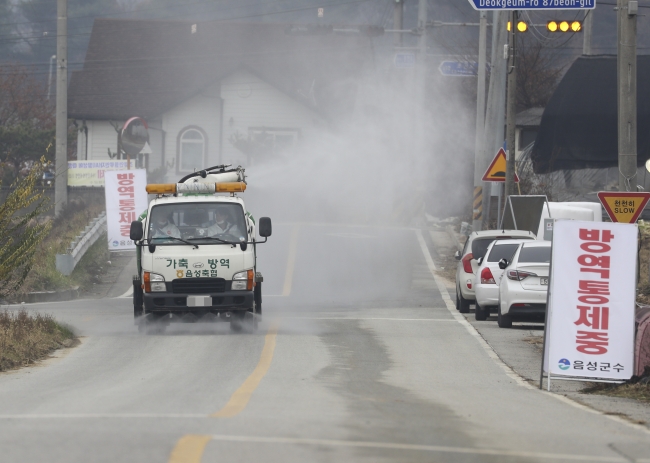Following the confirmation on bird flu cases at two poultry farms last week, the government said Monday that it received additional reports on highly pathogenic aviation influenza, or AI, outbreaks.
The Ministry of Food, Agriculture and Rural Affairs said that ducks at four farms were culled over the weekend in suspected AI outbreaks.
The virus -- confirmed to be the highly contagious H5N1 -- appears to be traveling along the west coastline after two confirmed cases last week, putting authorities on high alert after just three months of no reported AI cases.
The ministry confirmed Friday that the two AI cases occurred at a chicken farm in Haenam, South Jeolla Province, and a duck farm in Eumseong, North Chungcheong Province, which resulted in about 40,000 chickens and 22,000 ducks being culled.
 |
A vehicle passes through the quarantine line in Yangju, Gyeonggi Province, Monday after a report of a possible AI outbreak in one of the city‘s chicken farms. (Yonhap) |
New reported cases involve an egg farm in Yangju, Gyeonggi Province, where over 240 chickens were found dead and another duck farm in Cheongju, North Chungcheong Province, where 40 ducks died.
In confirmed cases, the animals were infected with the H5N6 AI virus, the same found in feces of migratory birds in the central region on Nov. 10, the ministry said.
Authorities said the virus seems to spread more quickly with a high mortality rate. AI viruses normally have seven to 21 days of incubation period before showing symptoms like sore throat, headache, chills and diarrhea.
South Korea has reported H5N1 and H5N8 bird flus in the past, but this is the first time H5N6 has been confirmed here. It has been detected in China, Vietnam, Laos and Hong Kong.
As for the outbreak of H5N6 cases in China, 15 people were infected and six have died since 2014.
The government said it will beef up quarantine and disinfection measures, urging livestock raisers to refrain from contacting wild birds.
The ministry put the farms under quarantine and banned stockbreeders from moving within a radius of 3 kilometers to prevent further spread of the virus. Around 250,000 chickens and ducks over 10 farms will be under quarantine.
The last bird flu outbreak in the country was detected in March in southern Seoul, leading to the slaughter of at least 11,000 birds. It lasted for only 13 days, which is far shorter than the previous outbreak that had continued for nearly two years between January 2014 and November 2015.
By Kim Da-sol (
ddd@heraldcorp.com)








![[Today’s K-pop] Blackpink’s Jennie, Lisa invited to Coachella as solo acts](http://res.heraldm.com/phpwas/restmb_idxmake.php?idx=644&simg=/content/image/2024/11/21/20241121050099_0.jpg)